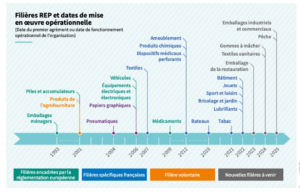Last December, the Fédération du Commerce Coopératif et Associé published “Frequently Asked Questions” on the subject of Extended Producer Responsibility (EPR).
In few words, the Extended Producer Responsibility (EPR):
It’s a measure that “aims to act on the entire life cycle of products, to build a more sustainable economy” (https://filieres-rep.ademe.fr/).
EPR focuses on eco-design of products, waste prevention, extension of product life cycles (reuse, recycling, repair, etc.) and end-of-life management.
The key principle of EPR is the “polluter pays” principle. Concretely, EPR has given rise to the principle of eco-contribution, as well as the obligation for certain professionals to take back used products disposed of by end-users.
EPR obligations do not apply to all professionals. They apply to individuals or legal entities (companies) who, on a professional basis, manufacture or import, or assemble or introduce onto the French market for the first time, products belonging to a sector subject to EPR.
As indicated in the FAQ of the Fédération du Commerce Coopératif et Associé, the following sectors are currently concerned:

What can we learn from the FAQ published by the Fédération du Commerce Coopératif et Associé?
The professionals concerned by EPR are subject to a number of obligations:
- Hold a unique identification number (IDU): this number justifies the registration of the professionals concerned in the national register managed by ADEME. It is issued either by the eco-organization to which the professional has subscribed, or directly by ADEME if the professional has set up an individual waste management system. As of January 1, 2022, this IDU must be included in professionals’ general terms and conditions of sale or any other contractual document communicated to the buyer.
- Transmit annually to ADEME:
- Proof of their membership of an eco-organization or the creation of an individual waste management system,
- data on products put on the market, including the rate of incorporation of recycled material in these products,
- data on the management of waste from these products, specifying material flows where applicable,
- data relevant to monitoring and determining quantitative and qualitative waste prevention and management targets.
- Paying and displaying eco-contribution (for professionals who have joined an eco-organization): eco-contribution is a financial contribution paid, for each product sold, by companies distributing or importing new products on the French market, to the eco-organization of which they are a member, in order to finance the end-of-life of these products. The eco-contribution is passed on in the same way from the manufacturer to the end customer, through all links in the marketing chain downstream of the product’s launch on the market.For the time being, the obligation to show eco-contribution on invoices only applies to the sale of electrical and electronic equipment and furnishings.
- Display the environmental characteristics of products: for most sectors, the professional who markets a product subject to EPR must inform the consumer of the environmental qualities and characteristics of waste-generating products, as well as any premiums and penalties paid by or received from an eco-organization.
- TRIMAN signage: producers, importers and distributors of products subject to EPR must display the TRIMAN logo on recyclable products and/or packaging, as well as information on recycling procedures on the product, packaging or documents supplied with the product.
- Take-back of used products: distributors of products subject to EPR must take back, or have taken back, free of charge, used products similar to those sold which the end-user discards (in the point of sales or at the delivery point).